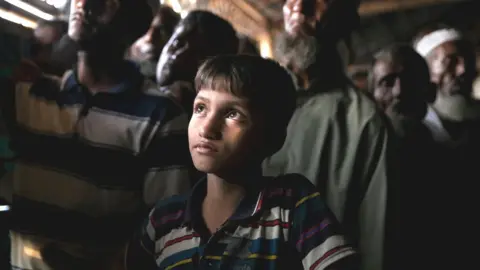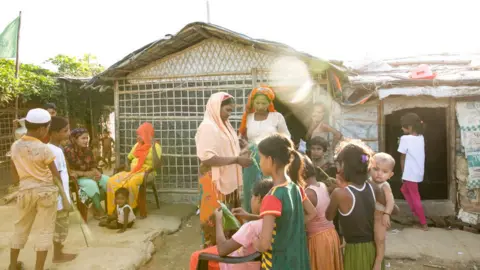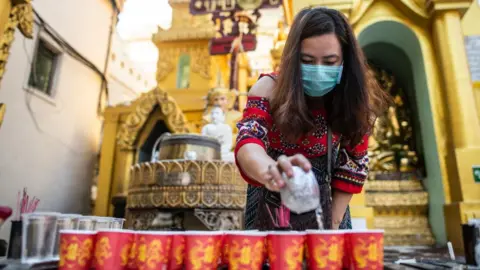Coronavirus threatens Myanmar's most vulnerable in displacement camps
 Getty Images
Getty ImagesAn estimated 350,000 displaced people across Myanmar are "sitting in the path of a public health catastrophe", says rights group Human Rights Watch (HRW).
Overcrowding, movement restrictions and poor sanitation have left these groups especially vulnerable to the coronavirus outbreak, HRW said.
Myanmar had its first infections last week and its first death on Monday.
A government official had previously claimed the country's "lifestyle and diet" protected its people.
Myanmar, which is home to around 51 million people, has a poor healthcare system.
A large percentage of the population does not have access to even basic healthcare, Associate Professor Nehginpao Kipgen of the Jindal School of International Affairs told BBC News - much less those who are displaced.
People living in camps often struggle to get even basic access to clean water and other essential services.
"Health conditions are already disastrous for displaced people in Rakhine, Kachin, and northern Shan camps, and now Covid-19 is threatening to decimate these vulnerable communities," said Brad Adams, Asia director of HRW.

- A SIMPLE GUIDE: How do I protect myself?
- MAPS AND CHARTS: Visual guide to the outbreak
- VIDEO: The 20-second hand wash
- STRESS: How to look after your mental health

UK-based charity organisation Oxfam shared some insight into the situation at one camp in Rakhine state - and how difficult it would be under normal circumstances to get treatment.
"If someone falls ill and needs more specialised care, they must seek and receive official permission, which often takes a few days... [and] pay for a security escort to travel with them to the hospital," said the organisation in a statement.
The potential to 'decimate' communities
Waves of communal violence in Myanmar have displaced tens of thousands of people, many from the persecuted Rohingya Muslim minority.
According to a report published on Monday by HRW, around 130,000 Muslims in Rakhine state live in open-air detention camps, with extremely restricted access to health facilities, none of which have Covid-19 testing facilities.
The report says that in such camps, one toilet is shared by as many as 40 people, one water access point by as many as 600 - making it easy for the virus to be transmitted.
 Getty Images
Getty ImagesIt adds that these people are "effectively imprisoned... arbitrarily denied freedom of movement" and therefore unable to access public health facilities even if they wanted to.
"Overcrowding in the camps is pervasive, making physical distancing nearly impossible and significantly increasing the risk of transmission," said the HRW report.
The report called on the government to lift restrictions on such camps, and to allocate additional space to people to allow for social distancing to happen.
But it's not just the conditions of displaced people that have experts worried.
"The World Health Organization has ranked Myanmar's healthcare system as one of world's worst after decades of neglect under the military rule," said Prof Kipgen.
"While cities like Yangon and Mandalay have better facilities, many parts of the country still don't even have basic healthcare services."
A healthy lifestyle and diet?
For weeks, authorities denied that there were any cases in the country, which shares a border with China. Hundreds of citizens cross the border every day to work in China, often illegally, say local reports.
"Myanmar shares a border with China [that is] over 2,200km long. It welcomed almost 750,000 Chinese visitors in 2019 - [its] largest source of tourism," said Prof Kipgen.
Myanmar's slow response to the outbreak has been heavily criticised. As of late March, around 300 virus tests had been carried out across the country, according to Reuters news agency.
 Getty Images
Getty ImagesGovernment spokesman Zaw Htay had said the absence of cases was due to Myanmar's "lifestyle and diet", adding that because citizens generally paid for purchases with cash instead of credit cards, they were unlikely to spread the virus.
Myanmar now has 14 confirmed cases of the virus, mostly from people who have travelled overseas. On Monday, it recorded its first virus-related death, a 69-year-old who also suffered from cancer. He had recently travelled to both Australia and Singapore.
There are currently 859,566 confirmed cases across the world with some 42,332 deaths according to a tally by Johns Hopkins University.
Reporting by the BBC's Yvette Tan
